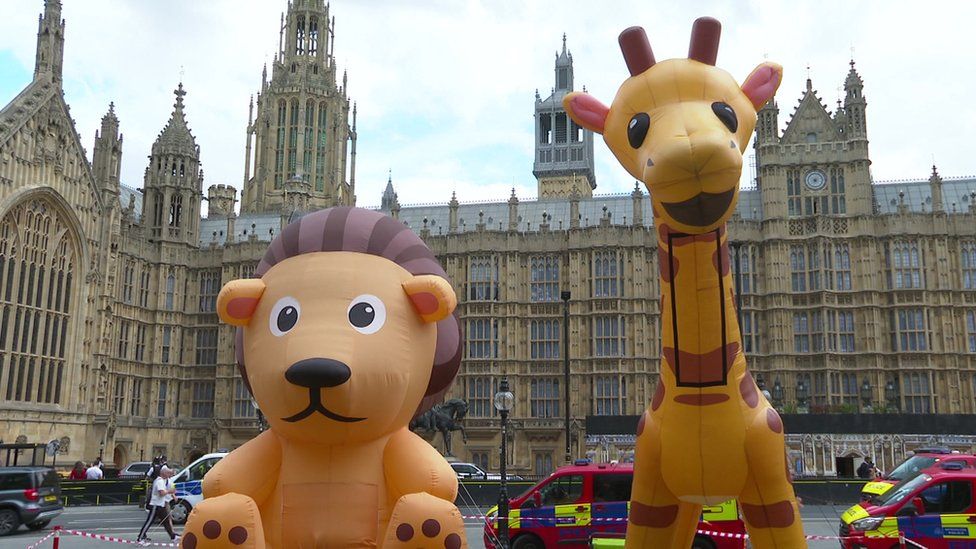ARTICLE AD BOX

Campaigners inflated two giant animal figures to protest the slow progress of the Hunting Trophies Bill
By Kate Whannel
Political reporter, BBC News
A Conservative MP has accused a group of peers in the House of Lords of trying to "frustrate" his Hunting Trophies Bill from becoming law.
Henry Smith's bill would ban hunters from bringing body parts of endangered species, like tusks, to Great Britain.
It passed the House of Commons with support from MPs across the parties.
However, Mr Smith says a "very small minority" of peers are now using "parliamentary devices" to stop the bill passing in the House of Lords.
In order to become law, the bill would need to be approved by both the House of Commons and Lords before the end of the parliamentary session on 7 November.
If the bill fails to pass both houses, it will be abandoned and the process would have to start again in the new session.
With Parliament closing between 20 September and 15 October during the party conference season, time is tight to get the proposed legislation over the line before the cut off date.
In March of this year, MPs backed the bill - however it has now run into difficulties in the House of Lords at committee stage of the process. This is the stage when peers debate the bill in detail.
On Tuesday evening, peers took more than three hours to debate just five of the 62 amendments proposed.
Usually these amendments would be grouped together, speeding up the process. However they were instead debated separately and in a further departure from tradition at committee stage, some amendments were pushed to a vote.
During the debate, DUP peer Lord Weir of Ballyholme said most amendments had been tabled by people opposed to the bill.
"Let's not pretend that the intention of these amendments is to particularly improve this bill. I think their impact would be to create the death by a thousand cuts of the bill."
Image source, Getty Images
Liberal Democrat Baroness Bakewell of Hardington Mandeville said some peers "of the landed gentry of the country, mostly hereditary" were "doing their utmost to filibuster and talk the bill out".
However, Conservative former minister Lord Swire said the proposers of the amendments were not trying to "wreck" the bill, but instead improve it.
He expressed concern that the current bill could damage the livelihoods of people in African countries.
His fellow Conservative peer Lord Caithness echoed his concerns saying: "For most hunters, bringing a trophy back is important.
"If one is prevented from doing that, either the hunt will not take place or, if it goes ahead, the hunter will not have to pay a trophy fee.
"In many places, the trophy fee makes up a significant part of the revenue and its loss would weaken the economic model of that area."
Hunters from the UK travel abroad, often to southern Africa, where they pay thousands of pounds to legally shoot animals such as lions or elephants.
Under current rules, they are allowed to bring back trophies from their trips - such as stuffed heads or horns - provided they have the correct paperwork.
If passed, the bill would fulfil a manifesto promise made by the Conservatives in the 2019 general election.
The slow progress of the proposed legislation prompted protests outside Parliament on Wednesday afternoon.
Campaigning alongside Mr Smith, Labour shadow animal welfare minister Ruth Jones said public support for the bill was "strong".
"Why would anyone want tusks in their living room?" she asked.
Edith Kebesiime, from World Animal Protection Africa, said the organisation was "bitterly disappointed" the bill had not got through its committee stage in Parliament.
She also dismissed arguments that the bill could harm local economies in Africa saying: "Most money does not reach local communities and there is very little evidence to show that it is reinvested into conservation."
Biodiversity Minister Trudy Harrison said: "I am disappointed that despite the overwhelming support from MPs and the public, the Hunting Trophies Bill failed to progress in the House of Lords.
"We will continue working to deliver this important manifesto commitment."
The Hunting Trophies Bill is a private member's bill and the rules around them are designed so that there needs to be a broad consensus behind the proposals, and if there isn't, they allow a small number of MPs or peers to block them.
The usual method is simply to spin out debate until time runs out, without the bill ever getting to a vote.
In the Commons, a hundred MPs can over-ride such tactics, if they support a "closure motion" which allows the bill to be forced to a vote.
In the Lords, where the House is self-regulating, and peers jealously guard their privileges, an attempt to shut down debate in this way is much harder, particularly when the subject is a private member's bill, rather than government legislation.

 1 year ago
36
1 year ago
36








 English (US) ·
English (US) ·